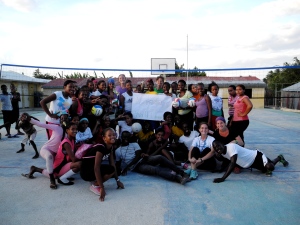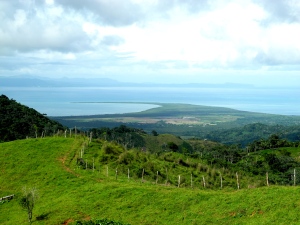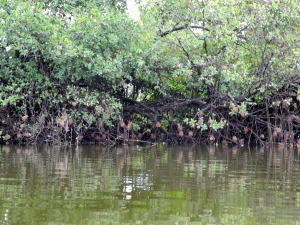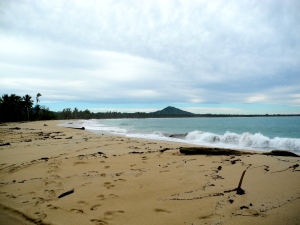One of the many perks of being as a Peace Corps Volunteer on a tropical island is that there are other PCVs serving on it with you. They’ll invite you to partake in cool things like volleyball tournaments and kayak tours.

More than 4 different communities attended the activity where young teenage girls learned about healthy relationships, team building, and fundraising among other topics
Kayak Limón is located close to the city of Miches in El Seibo, a province in the eastern part of the Dominican Republic. While the east boasts sought-after beaches and all-inclusive hotels fit for Hollywood’s A-list, it is also home to hundreds of sugarcane-cutting communities of stateless citizens, a surplus of passion fruit, and off-the-beaten-path eco-tourism projects.
Kayak Limón operates out of Los Guineos (The Bananas), taking visitors out in kayaks to explore Laguna Limón and to understand the various ecosystems that compose it. To enhance the tourist’s exposure to Dominican culture by steering away from the all-inclusive experience, Kayak Limón plans to host visitors while they pass through the area for the tour. We met with two women to discuss hospitality and food preparation so that when overnight guests do begin to arrive, various homes are equipped to share Dominican culture with foreigners in an authentic, sanitary, and profitable manner.
Reassured of the genuineness and generosity of Dominicans, I headed back to my own site, motivated to continue capacitating others in ways I knew how to. While many jóvenes are aspiring to ser profesionales (be professionals), there is typically little support from either the school or household in terms of the skills or preparation required to get them there. Keeping in mind my duty as a Business volunteer, I developed a workshop that focused on professional development for young adults that could strengthen their self-esteem, enhance their financial management, and increase their opportunities look for and/or obtain jobs. The workshop lasted for four Sundays and was implemented in the following format:
- What do we count on as of now?
- SWOT analysis (strengths, weaknesses, opportunities, threats)
- Resumé Building: what is a Curriculum Vitae, what is it used for, and how do we create one
- Professionalism with Invited Speaker
- What is professionalism? *** Here, many people consider a ‘professional’ to be someone who has a university diploma, so we stressed that one’s professionalism is a) based on both internal and external attributes and b) is a combination of your abilities, knowledge, and expertise i.e. that a person might have a degree but might not be a legitimate professional ***
- How to prepare for an Interview
- Role Plays of various Professionalism scenarios
- Goals and Savings
- What is a goal? What are the criteria to establish one? (realistic, specific, important, measurable, action)
- What is savings? Why is saving important? What are the benefits of saving in a bank as opposed to your own home?
- How can we use savings to achieve our goals?
- Networking (was supposed to have another speaker come but he cancelled last minute)
- What is networking?
- Elevator Speeches
- How your Professionalism affects Networking
This course took a significant amount of planning, but it turned out to be one of the most successful projects I’ve coordinated while in site, especially because it supports my goals and role as a Community Economic Development volunteer. 46 jóvenes ages 15 to 30 graduated from the course. Having sought support from a local bank, three graduates were also offered the opportunity to start a savings account with the minimum deposit already provided for them. I’m hoping to develop the curriculum into a formal lesson plan or manual so that other volunteers can use it to meet the needs of a population with such potential but not enough resources.
While working with the youth in Pescadería has provided me with some of the most surprising and rewarding moments of my service, there are many factors that make it one of the more difficult parts as well. I’ve stressed how worthwhile it has been to integrate myself into this community. I go out dancing, make spaghetti with my girlfriends, offer Internet and homework help, and have even learned to make comebacks at the guys when they hit on me. I’m integrated, and life is good. When I’m in a position of authority however, like in this workshop we just finished, the gears change and both parties still seem to be unfamiliar with each other’s expectations. In the end, it really comes down to culture and not age, but the youth are typically the ones that like to find out how far they can stretch the boundaries.
In the professionalism workshop, I explained at the beginning that the participants would be expected to attend the course, participate, and complete all homework assignments, and those that do so would graduate. When the course finished, multiple people were disgruntled when I told them that they wouldn’t be receiving a diploma. The fact was that while she found a way to turn in all of the assignments, she only showed up for only one Sunday. Another student, who happens to be one of my best guy friends here, attended and participated in all four workshops, but didn’t turn in any homework.
It is in these situations where I’m both reassured and puzzled by the mission of Peace Corps:
- To help the people of interested countries in meeting their need for trained men and women
- To help promote a better understanding of Americans on the part of the peoples served
- To help promote a better understanding of other peoples on the part of Americans
Essentially two thirds of our work is for us – to make friends and share culture – and it’s a frustratingly real concept that many people don’t like to admit. The other third is the meat – capacity building –, which for me anyway seems to emulate the best and worst parts of service. The issue that I’ve been trying to explain above is essentially the act of balancing these three goals – doing my job in a place where I’m still coping with differences in culture and expectations, and where others will always be questioning and/or learning about mine. As a foreign facilitator, it is not acceptable that a student, having known the expectations of the course, graduates without having completed the homework or with insufficient attendance. But here, in his/her own culture, it may acceptable, and unfortunately it often is. On another occasion, I saw teachers sit around the school while their students held a nearly violent strike because they didn’t like what was being served for lunch. Am I wrong to get frustrated at the fact that they are held to another standard based on differing cultural values or expectations? Is it fair to them that I hold them to what my culture has taught me is wrong and right? How can one manage the task of forming both friendships and productive working relationships where there exists such differences?
The professionalism workshop example is fairly black and white, but it still lends itself to the difficulty of finding a productive or satisfying balance between cultural expectations, integration, and effective development – and doing so without creating too much of a fuss. I’d also like to point out that while it is sometimes discouraging to clash cultures with even your closest of friends, I understand that is all part of the experience. I still go out dancing, we still make spaghetti, I share my Internet, and make comebacks at the tígueres; I also share my own culture and experience to open opportunities and expand knowledge for those that have shared their culture with me here. Whether it is touring lagoons with a mangrove connoisseur or explaining to youth that Facebook is typically not considered a professional way to network, I’ll continue to seek for such balance; it’s complexity is intriguing, and it’s mastery is the key to unlocking change and understanding.
“There is no decision that we can make that doesn’t come with some sort of balance or sacrifice.”






















